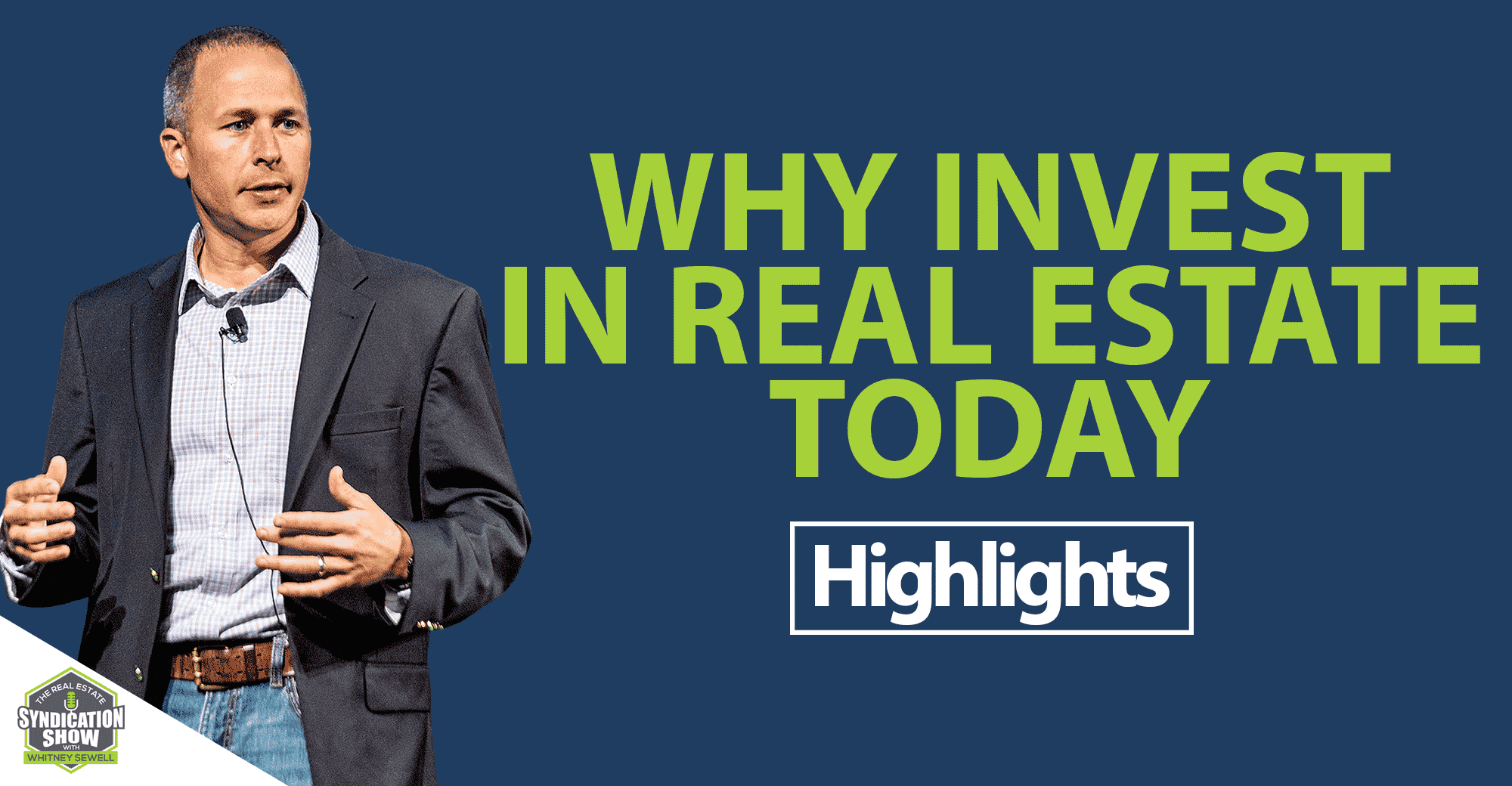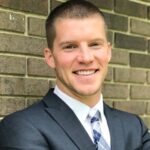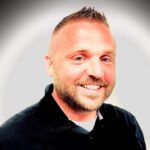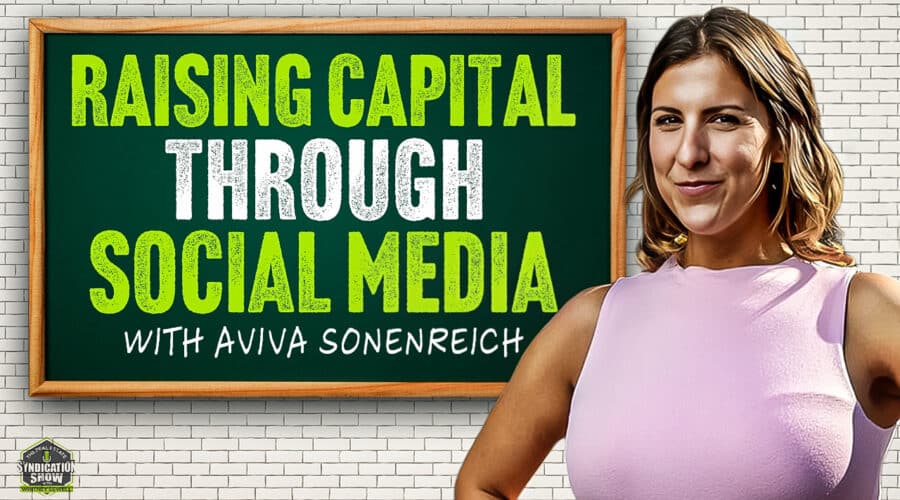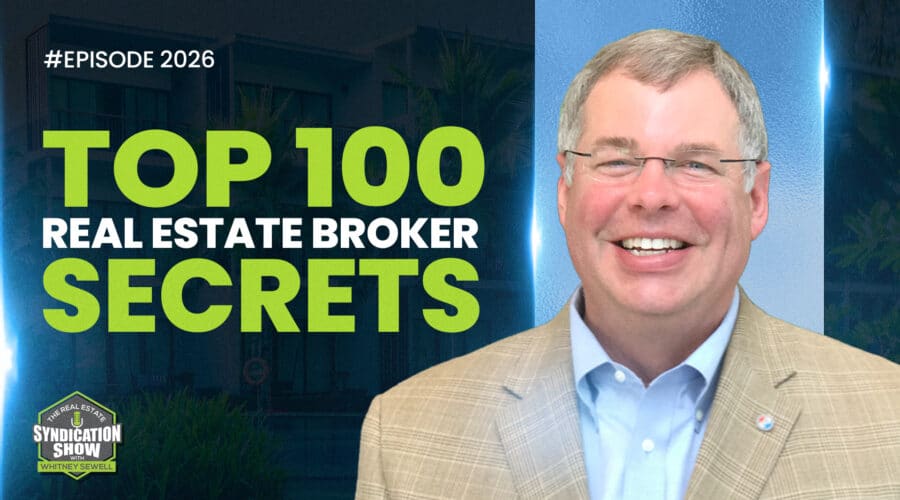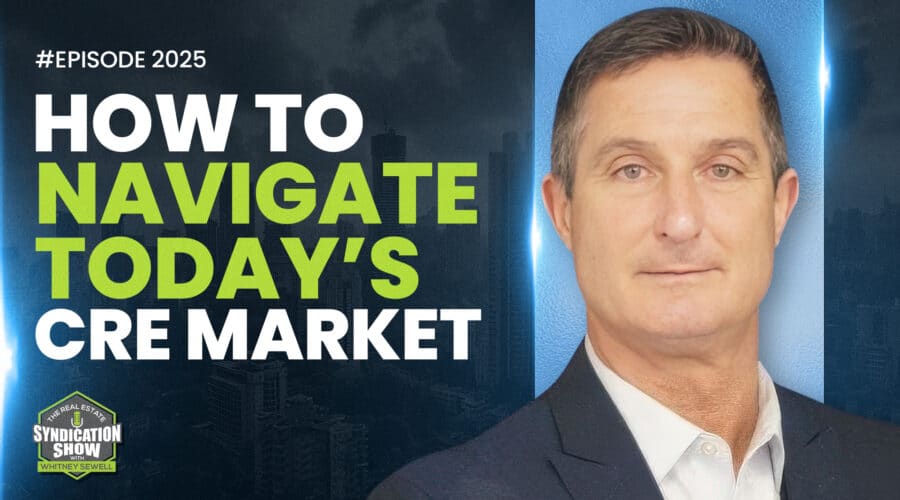When is the best time to invest in real estate? Most people in the space will tell you that today is the best time to do so. In this #Highlights episode, we look back at our conversations with Lee Yoder and Todd Pultz. The two are entrepreneurs who found success in real estate investing.
Watch the episode here:
Listen to the podcast here:
Lee talks about how investing was the perfect outlet for his entrepreneurial spirit that also allowed him to focus on the priorities in life – his family and his relationship with God. Meanwhile, Todd walks us through his real estate journey so far, and how having his house foreclosed and his truck towed away in front of his in-laws motivated him to find a way to create a new life for himself. Listen now and be inspired by Lee and Todd’s real estate journey!
Key Points From This Episode:
- Lee shares his story and talks about his realization that he was an entrepreneur.
- How real estate gave Lee the time to focus on his family and religion.
- How Lee’s partnership with both his wife and God informs his business.
- Learn the two things that Lee thinks real estate investors need to be successful.
- Todd’s background and the pivotal moment that led to him pursuing real estate investing.
- The incredible story of Todd’s first deal and his negotiation skills.
- How Todd learned more about the world of multifamily through his first deal.
- One of the biggest mistakes that Todd made early on in his real estate journey.
- The impact that briefly meeting Whitney at a conference has had on Todd’s career.
Tweet This!
“When you’ve been an entrepreneur, it can get very busy and you can be consumed by it. Especially, I think a lot of people get into one of those types of people that really enjoy work as I do, and really just want to go after it like their hair is on fire. And you got to stop and think, “Hey, what’s most important to me?” That’s been a journey for me.” – Lee Yoder
“Do the little things to raise the capital with those big deals and do little things to develop relationships with brokers.” – Lee Yoder
“And one of the things people forget about sometimes is your everyday interactions and how much impact you can have on somebody.” – Todd Pultz
Links Mentioned in Today’s Episode:
Threefold Real Estate Investing
Threefold Real Estate Investing Podcast
WS627: Four Multifamily Properties in Four Months with Lee Yoder
WS666: From Foreclosure and Tornados to Success in Real Estate with Todd Pultz
About Lee Yoder
Lee Yoder was practicing as a physical therapist when he realized his true passion was building his own business and investing in real estate. He has taken this passion and has quickly built a portfolio with several small apartment buildings. Lee is also the founder of Threefold Real Estate Investing, a company focused on multifamily investments. Lee hosts the Threefold Real Estate Investing Podcast, which reflects his interest in multifamily real estate investing and pursuing better relationships with his family and God.
About Todd Pultz
Todd Pultz is a real estate investor from Dayton, OH, who focuses on multifamily properties and flips. Growing up in the inner city and trailer parks with very little, Todd truly believes he is living the American Dream. He has a love for sports and has coached various sports at multiple levels. Currently, Todd is married to Lisa with three kids. His wife, Lisa, is an amazing woman and works as an ICU nurse. In 2013, Todd acted on his curiosity for real estate and jumped in feet first by purchasing his first 4-unit building. He was quickly addicted to real estate and surprised at the passion he developed for the industry. His journey to date has continued, and he has acquired over 100 doors in the same market through creative financing options and cash flow management. During this time, his love for rehab developed for Todd, and he successfully fixed and flipped dozens of properties. Most recently, Todd has been working on development deals as well as on some outside-the-box ideas. Todd personally manages all doors and projects while maintaining full-time employment as the Vice President of a large security firm. With a police background, often he finds opportunities in properties that might scare off others. Todd has a degree in criminal justice and is a certified interrogator. Additionally, Todd is a licensed Realtor in Ohio. Todd has had phenomenal mentors and surrounded himself with incredible people who have contributed to his success. He believes in giving back through multiple avenues including civic service. Todd believes in treating people right always as it will come back to you magnified. Fighting through personal and business struggles, Todd has come out stronger than ever and is laser-focused on real estate and ready to scale larger and do more.
Full Transcript
EPISODE 1420
[INTRODUCTION]
Whitney Sewell (WS): This is your Daily Real Estate Syndication Show and I’m your host, Whitney Sewell. Today we packed a number of shows together to give you some highlights. I know you’re gonna enjoy this show. Thank you for being with us today!
[INTERVIEW 1]
WS: Our guest is Lee Yoder. Thanks for being on the show, Lee.
LY: Yeah, thanks for having me. It’s a real pleasure, Whitney.
WS: I’m honored to have you on the show, Lee. Lee, says no one in his family invested in anything other than a 401k before he got started in real estate. He bought his first 3 multifamily properties within four months of each other and he is able to involve his family in their multifamily business and maintain his priorities, which are God, his wife, his kids, and his real estate investing. Lee, grateful to have you on the show. I love that you have your priorities in place and I want to get into that just a little bit — and obviously just the name of your company and what that means. I just think you and I would agree on a lot of things as far as that’s concerned and I think a lot of the listeners will as well, and we’ll appreciate your outlook on how you’ve been successful because of those things, those priorities. But give us a little bit more about you and let’s just jump right into that and maybe where you’re located.
LY: Yeah. I’m in — just north of Cincinnati, Ohio. Like you said, yeah, didn’t have really any entrepreneurs in my family that was starting a business or investing or anything. I didn’t know I was an entrepreneur because I didn’t know what that looked like. I’m actually a physical therapist by trade. I was actually doing home health physical therapy, which was great for the family because it’s very flexible. It’s a good income, but I was just really bored. I mean, not fulfilled, not challenged. So kind of got in on the corporate side and started climbing the corporate ladder, which was very exciting for me. I was really building out our home health physical therapy division. So I was getting experience building a company a little bit. So that was very exciting and very challenging and fulfilling for me. Not so good for the family. Had a couple of young kids, and my wife and I were starting our family. So, not good in that way.
I actually went back to doing the home health physical therapy but involved real estate. Before this, a friend had kind of tipped me off, so I read the Rich Dad Poor Dad book like everybody and thought — and just like a lot of people, it spoke to me and I started to realize like, “I think I’m an entrepreneur. I think I like this.”
Now, my dad is in construction, and I had done some construction. So real estate seemed kind of natural to me anyway. I like the idea of doing rehabs. Yeah, I kind of jumped in and flipped a house pretty quickly. But again, I wasn’t able to control my time. So again, it just wasn’t good for the young family. My kids were young. So they couldn’t really be involved in the flipping part. So my wife just felt like a single mother for a few months while we were trying to hustle to get it done. Yeah, Whitney, like you said, I’m really focused on — I mean, real estate for me is an opportunity to be challenged, to build something, to build wealth, but also be able to control my time. Because that’s the most important thing to me so that I can still pursue my walk with Christ and pursue my family and do that really well.
Real estate, as I said, the first flip wasn’t really like that. It’s not easy to do that. Real estate doesn’t make that easy. When you’re building something when you’ve been an entrepreneur, it can get very busy and you can be consumed by it. Especially, I think a lot of people get into one of those types of people that really enjoy work as I do, and really just want to go after it like their hair is on fire. And you got to stop and think, “Hey, what’s most important to me?” That’s been a journey for me. That’s where we came up with the name Threefold, where my wife and I intend to partner with the investors that we work with, but we also partner with God to make sure that we’re keeping our priorities straight. That we remember why we’re here on Earth, and that there’s a lot more to it than just building a real estate portfolio, even though as a career, that’s my ultimate goal.
WS: I couldn’t agree more, and just how important our walk with the Lord is and how he has guided us and blessed our business as well. He’s been very kind, of course. But also, you mentioned in your bio that you’re a ‘ready, fire, aim’ type of guy and it caused you to slow down. Can elaborate on that a little bit, because I think there are probably many listeners who are in that same boat.
LY: Yeah, absolutely. I mean, I’ll just say I think it really takes two things to be a good, successful real estate investor, and I think the first one is — Grant Cardone. I didn’t read his book, and I’m not necessarily a huge fan, but he wrote the book called 10X — and I think you do have to be able to have a big vision because I would say — I don’t know what you’d say, Whitney, but like maybe 95% of people have never really thought about owning more than their own house. I do think you have to have that — be able to think big. I’ve got that in spades. God did give me that. So I don’t have a problem with that. I can think pretty big and come up with dreams that most people would say, “Lee, you have no business dreaming that. That’s so far off.”
But the other thing I think you really have to have that’s a real challenge for me is the compound effect, Darren Hardy, and just staying diligent and doing the little things day after day after day that take you toward that big goal, instead of the shiny-object syndrome. Or just kind of trying to stay busy, but doing little things each day, and that’s where I struggle. Where I feel like God has been working on me, and he gave me a wife that struggles with the 10X part. She thinks owning our house and me just doing physical therapy would be great. Just stay safe. Save a little bit and do that whole route. That’s what her parents did. That’s what my parents did. But she’s really good about keeping the details straight.
So far, I don’t have a partner in all these, but my wife has been my partner, but I feel like that’s something God has really been working on me — and just slowing down a little bit, because I always tell her, when we flipped the first house, it didn’t go very well. If she’d been all-in like me and just, “Hey, let’s just go, go, go, go, go,” I probably would have flipped 10 houses. But that wouldn’t have gotten me closer to my ultimate goal of owning larger multifamily deals. The fact that we did kind of slow down after that and go, “Let’s take a breath. Let’s think about this,” it caused me to not flip another house because I think you’ll hear a lot of guys that flip 30 houses and then they bought some small multifamily and then 10 years later maybe they realized, “Man! The bigger multifamily stuff is where it’s at,” and they got into that.
I was slowing down and listening and educating myself and having my wife say, “That flip, here’s why it wasn’t that great for our family.” Because of that, I didn’t flip 30 houses. I flipped one. I realized, “Hey, that wasn’t what I’m looking for. Ultimately, I’m trying to get a multifamily. So let’s go that route.” So it took us a year to flip the first house and move into multifamily, but we moved pretty quickly because I didn’t — I just try to stay busy and just do a bunch of things by flipping a bunch of houses, which I probably would’ve done if it weren’t for my wife and for God leading me in different directions and slowing me down a little bit.
WS: Well, I mean a year from your flip to getting into a larger multifamily is, I mean, pretty quick, I think for most people. I think that’s really good. It’s unfortunate, a lot of people are — they’re getting started for a long, long time. It’s like they’re getting started in real estate, but it’s like three years since they got started, getting started.
But I wanted to go back a little bit to — unfortunately, I have heard great things about that book, but I’ve not read it, it is going to have to go on the top of my list very soon because I’ve heard great things about it. I would like to know some of the daily things that changed for you after reading that book. Because, I mean, I have a similar story as far as how my habits changed and some things that happen that are like, “Okay, I can start seeing success in my business,” and I give all that glory to the Lord, but whether it’s to a book or whatever. But what were some of those things for you that helps you to see things that you needed to do differently — and even if they’re little things?
LY: Yeah. Well, I think when I — Now that I’m really trying to get into apartment syndication, I think, you know, following guys like you, and Joe Fairless. What I realized is to buy a big apartment building, you’ve got to raise a lot of capital, and a lot of things go into that. And it’s a long-term relationship you’ve got to have with people and you’ve got to build up that networking and you’ve got to build a brain. You got to do a lot of different things like that to build up the capital. Then in order to really find good deals, you’ve got to build a lot of relationships with brokers. You might set up a mailing campaign, do some things like that.
What I would like to do when I get up in the morning is just jump online and look at deals. That’s the fun part. That’s my natural — is just, I’m just going after the kill. I want to go look at deals. That’s not the compound effect. To me, that’s like the 10X thinking of like, “Let’s go big right now and just go after it.” The compound effect to me is getting up and saying, “Okay, what am I doing today to build long-term relationships with some new investors?” I’m starting a podcast. I built a website. That stuff that you can do today, that’s really not going to pay off for months, maybe years, right? To me, that’s the compound effect, which is doing the things that say, “What can I do today that’s going to benefit me in a year?
When I jump online and look at a deal, I’m trying to find something to put onto the contract today. The deals that are available to people that want to do that aren’t the best deals. And then are you going to have the capital ready? What I’m trying to change is when I get up, to resist the temptation, just go look for deals right now. But instead, do the little things to raise the capital with those big deals and do little things to develop relationships with brokers. Yeah, so just building out my brain. It’s all the little things that go under that. And we’d get into more of that.
WS: Yeah.
LY: You and I had talked that Joe Fairless is — He wrote a book called the Best Ever Real Estate Syndication, and I think that just lays it out.
WS: I got it right here.
LY: Looks like you’ve been through it a few times. Yeah. I know.
WS: Yeah, it is a little torn up.
LY: Yeah. That just lays it out. Honestly, I just follow that. But like I said, that’s hard for me to follow those steps to be diligent like that. I think if you really want to buy big multifamily properties, that’s what it takes.
[INTERVIEW 2]
WS: Our guest is Todd Pultz. Thanks for being on the show, Todd.
TP: Hey! Thanks for having me, Whitney. I’m excited to be here with you.
WS: Honored to have you on this show, Todd. A little about Todd, in case you don’t know him. He’s a multifamily investor and flipper from the state of Ohio, home of none other than the Buckeyes. Currently with over 100 doors owned, dozens of successful flips and some mistakes along the way. He personally manages these properties and projects while still working a full-time job as the VP for a large security firm and while keeping his princess wife happy.
So, welcome the show, Todd. I’m grateful to have you on. There are so much just right there that we could talk about, I mean, while working full-time and making this happen. I love talking about the, because I’ve experienced that myself. I know so many the listeners are pushing to do the same thing to get into this business. And you’ve had real estate success and while I working full time in the family as well.
So, give us little more about you, Todd. I know you have a story you want to share as well. But tell us that and then give us a little more about how you got into your real estate business and why and then let’s jump in to your super power.
TP: Sure. Well, I’m glad you started off mentioning my wife. Otherwise I would have been in big trouble, Whitney. So, thanks for doing that. A little bit about me, I grew up in Dayton, Ohio. Actually, suburb of Dayton, right on board called Riverside, Ohio. Kind of a typical story that I hear from a lot of guys and jump in, trying to create wealth at real estate. I grew up in a trailer park, fairly poor. The dad that jumped around job to job. My mom only made it through eight grade. She was a stay-at-home mom. We didn’t have a lot growing up. Along the way, I didn’t have anybody in my life that taught me about finances or even managing a checkbook. I didn’t know how to set up a checking account to be honest with you.
But at the end of the day I decided I want to do something a little bit better and decided to go to college to get my criminal justice degree and moved into my career in law enforcement as a police officer.
From there, at some point along the way, I jumped into corporate investigation with a large retail organization. And right around 2013 I decided to jump into real estate. Since then we’ve done dozens of flips. We own hundreds of doors in the Dayton market.
But really that reason I jumped into real estate, I don’t think it was accident, but I can tell you the moment that I realized I wanted do that when my wife and I first got together. Again, I told you I grew up without really anybody teach me about finances. 10, 11 years ago, if I had a 500-credit score, that was a really good day, right?
When my wife and I were first together and I was at her house, I was going through a foreclosure on my first home. My house was getting foreclosed off. And as we’re sitting down and watching a movie, I had some tow truck show up in the front of the house and they were hooking up my truck, right? They repo-ing it. I flipped outside and said, “What are they doing?” At that moment we kind of had to come to terms with the fact that I wasn’t doing good financially. Although I had a good job, it was paying good, I didn’t know how to manage any of that.
Really, the embarrassing part, her mom and dad lived right across the street from us, right? I had to make up the story that I had the maintenance techs up come pick up the car. They’re going to work on that night. But it was kind of that moment where I said, “You know what? I got to change. I got to do something different.” I need to start thinking about my family and the family that we’re going to build and how do I build that wealth? That’s really when I made the decision to jump into real estate.
So, I had about $10,000 in one of my retirement accounts and I called now my boss, one of my business partners, but he’s been my mentor along the way and I say, “Hey, I got 10k. I want to do something at real estate. If I find us a four-unit apartment building, will you give me 10K also and let’s go in and buy this building?” I think he kind of laughed and he said, “Where are you going to find a $20,000 four-unit apartment building that you don’t have to put crazy amount of cash into rehab?” I said, “I don’t know. But I’m willing to try.”
So, we spent about the next two or three months trying to find a property and found a property that was listed like $65,000, $70,000. Wasn’t in bad shape. It was in the C class neighborhood. I said, “I might not be able to get it for 20k, but let me practice my negotiation skills. At the end of the day, we found it was a guy that had it on land contract from a guy out of Iowa who had bought it on auction. Horrible relationship. He had never paid the actual owner a cent. They were behind taxes. And at end of the day, we give the land contract guy a thousand dollars to go away and we gave the actual owner $19,000 to pay the property off. Get his money back from foreclosure and pay his taxes. So, we ended up getting into that deal for right at $21,000. My mentor at that time put 12k in to rehab it. I took him out about a year. That was my first property and that’s kind of how it all started.
WS: Wow! You were going through a hard time there. You’re being foreclosed on. Your vehicle was getting towed. What an impression on the future in-laws and your future spouse. I can’t remember if she was your girlfriend at the time or what. But wow! That was the turning point, right? You said, “I’ve got to make a change.” And it’s unfortunate, a lot of people, don’t make that decision, right? They don’t make that decision and have a turning point like you did. But look at you now. It’s just incredible. And you made that happen. You made that deal work. Give us some more details about that project and then I’d love to fast-forward into a kind of where you’re at now and maybe a few things along the way that helped you to build the business that you have now.
TP: Sure. That project was – I had read and I’m not a big reader. I don’t read books. So, everybody that says they read Rich Dad Poor Dad, which is almost everybody, I’m going to confess right now, I’ve not read it. I’ve seen bits and pieces of it and my friends tell me everything that’s in it. So, I feel like I’ve read it. But I just immersed myself in the internet and talking to people. But honestly, my mentor at the time had a few rental properties. But the thing that he had that is really hard to find is he is probably the most incredible entrepreneur I’ve ever met in my life. One of the smartest guys, but he had a security company. He’s at multiple companies that he started. Just a very successful guy.
So, he helped me in that real estate piece right then. But neither one of us really had a big connection with rehabbing or managing multifamily properties, although he had a couple of them. But we found the right crews to come in and knock it out [inaudible 00:06:10] with 12K, which is just really turning apartment. And then I just learned. I learned how to operate. I learned how to be a manager. I talked to people. I talked to friends and family, and I didn’t reach out to any other investors, because I didn’t really understand networking at that time. And I just ask people like, “How would you want to be treated if you live in an apartment? What do you expect your landlord to do? What do you expect the owner to do?” We made some mistakes along the way.
Matter of fact, one of the biggest mistakes and losses that I had was kind of right after that. So, I was on top of the world. As I was, “Look. I found this property $20,000, right? We’re killing it. And I didn’t know how successful that property would be until two years ago when I finally sold it to fund my wife’s inground pool. But at that time, I was feeling like, “Man! We can conquer the world.” And I found a six-unit building around the corner, and it was almost completely rehabbed.
There was a guy who actually was selling some drugs in the apartment and unfortunately was murdered in one of the units. But he had 4 out of 6 to the hill just absolutely remodeled. It was going to be beautiful. And the same thing, we got that under contract with back taxes, which was 20 bucks, and we’re only going to have to put about 30,000, 40,000 to get it ready. The biggest mistake that we made was we closed on a late Friday night. Completely forgot to put insurance on the building. Monday morning, I’m waking up to go into the building and watch the news and I see a building, an apartment building on fire. Just kind of burning to the ground. And that was our building. And we didn’t have insurance on it.
So that building went – It was a complete loss, and that was a huge lesson. So very quickly within that same year feeling like I was on top of the world and that I could do this. We got hit with that, right? So, we could’ve made a decision at that point to either tuck tail and run away or, “You know what? Let’s suck it up.”
And I’ll tell you, my wife, at the time, that I was not an easy conversation. Letting her know that we just burned $20,000. But I do have a real quick story about you, Whitney. And I think sometimes on podcasts, we hear a lot about the guest. One of the things that I wish we heard more about on some podcasts was about the actual person put on the podcast.
For you, you’re probably not going to remember this, because you talk to thousands and thousands of people. But at the end of 2019, I went to the conference out in Palo Alto and you’re there, you’re one of the presenters if you remember, and we met for a brief moment. And I’m not going to make this like a love story, but we met for a very brief moment and I knew right away like, “Hey, this is a genuine dude. A guy that you should really listen to.” And listening to your story on stage. I listened to the adoption and your wife. And at one point you figured out that you needed to maybe start looking at partners and networking.
And when I came back to Ohio after that conference, I took a deep look at myself and I said, “What am I not good at? What is the one area that I fail in?” For me, it was always staying to myself in real estate I never reached out. I never networked. I never talked to anybody else in real estate. I just did it on my own, and that was it.
But after listing you that day and kind of your story and your journey and kind of seeing what you’re doing, I thought, “Man! You know what? I need to make some changes.” And networking just in the last six months has become a piece of my everyday business and what I’m really trying to focus on, not because I’m doing syndication or trying to raise funds. I think it’s good for the soul, man.
And one of the things people forget about sometimes is your everyday interactions and how much impact you can have on somebody. In that brief two minutes that you and I set aside each other at that conference and that presentation that you gave at the conference, you didn’t know that “Hey, it’s Todd Pultz of Dayton, Ohio is sitting in the back of the room listening and hanging on to every word that you say.”
But you impacted me and you impacted me in a very important way. And since then, we did start a partnership with three people. One of them being my original mentor, and then two from Nevada. And if I would’ve never listened to you or heard your journey or heard your story that day, I wouldn’t have ever thought about it, and I probably wouldn’t have even begun networking. But don’t forget how much impact you have on people, Whitney, and I appreciate that.
[END OF INTERVIEW]
[OUTRO]
Whitney Sewell: Thank you for being a loyal listener of The Real Estate Syndication Show. Please subscribe and like the show. Share with your friends so we can help them as well. Don’t forget to go to LifeBridgeCapital.com where you can sign up and start investing in real estate today. Have a blessed day!
[END]
Love the show? Subscribe, rate, review, and share!
Join the Real Estate Syndication Show Community:

